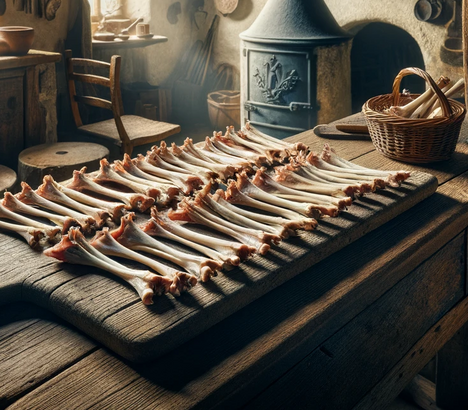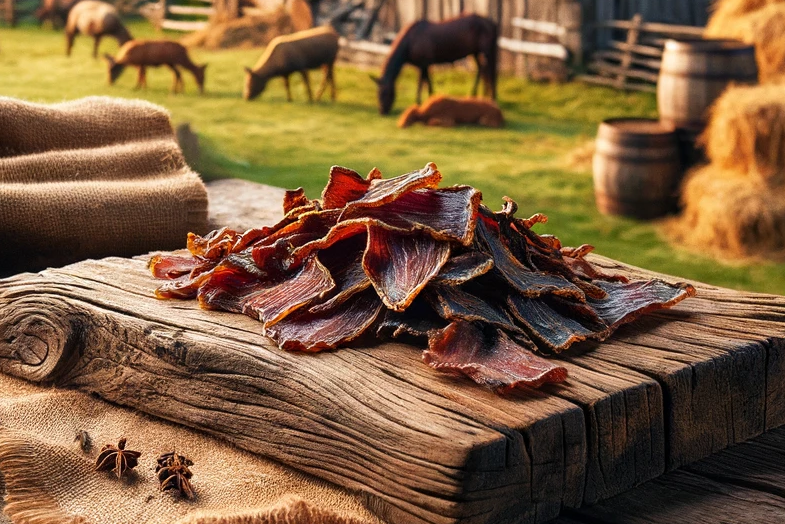Dried duck meat

In the diverse world of dog food, the search for healthy, nutritious yet tasty snacks never stands still. Dried duck meat has emerged as a popular choice for dog owners who want to give their furry friends a treat. But what's behind this tasty treat, and how does it compare to other dog snacks? This article takes a comprehensive look at dry duck meat, its benefits, potential drawbacks and what it means for your dog's diet.
What is dried duck meat?
Dried duck meat is made from fresh duck meat that has had moisture removed through drying processes such as air-drying or dehydration. This process naturally preserves the meat without the need for additives or preservatives. The result is a long-lasting, nutritious and easily digestible snack that is known by dogs for its tasty texture and intense flavor.
Benefits of dried duck meat for dogs
High nutritional value
Dried duck meat is rich in high-quality proteins, which are essential for building and maintaining muscle tissue. Protein is also important for healthy skin, a shiny coat and your dog's overall health.
Hypoallergenic property
For dogs with food allergies or sensitivities, dried duck meat can be an excellent alternative. Duck meat is less common in dog diets and therefore less likely to trigger allergic reactions than more conventional protein sources.
Good digestibility
The gentle drying process not only preserves the nutrients, but also ensures that the meat is easily digestible. This makes dried duck meat a good option for dogs with sensitive stomachs.
Natural dental care
Chewing on the tough, dry meat can help to naturally clean the teeth and reduce tartar build-up and bad breath.
Disadvantages and risks
Calorie content
Like all dried meat products, dried duck meat is high in calories. Excessive feeding can lead to weight gain and associated health problems, especially in dogs with low energy requirements.
Differences in quality
The quality of dried duck meat can vary greatly, depending on the manufacturer and origin. Lower quality products may contain additives or preservatives that are not ideal for your dog's diet.
Cost
High quality dried duck meat can be more expensive than other snacks or dried meats. For some dog owners, this could be a limiting factor.
Risk of bacteria
Although the risk is low, improperly processed or stored dried meat products can contain bacteria such as salmonella. Correct storage and handling are therefore essential.
A tasty and healthy option with moderation
Dried duck meat offers a wealth of benefits for dogs, from high nutritional value to supporting dental health. Its hypoallergenic properties and good digestibility make it an excellent snack, especially for diet-sensitive dogs. Nevertheless, it is important to control the amount fed and pay attention to the quality of the product to minimize potential risks.
If you notice any signs of hypersensitivity or poisoning in your dog, you should see your vet immediately. We are not a substitute for a vet, but we try to be as accurate as possible. Every dog reacts differently and we recommend you get a second opinion or consult your vet if in doubt.
Stay healthy and take good care of your four-legged friend!😊
Similar to Dried duck meat
What is beef jerky? Beef jerky is a type of dried meat that is made from beef. The meat is cut into thin slices and dried at a low temperature. The drying process causes the meat to lose most of its...
In simple terms, dried goat meat is dried meat from goats. The drying process removes much of the water content from the meat, resulting in an easily digestible, nutrient-rich snack. This process...
Horse jerky is a natural snack for dogs that is produced by drying horse meat. This process removes moisture and preserves the meat naturally, making it longer lasting and easily digestible. It is...
Venison jerky is made from the meat of wild animals such as deer, elk or wild boar. The dehydration process, in which the meat is slowly dried at a low temperature, removes moisture from the meat,...


